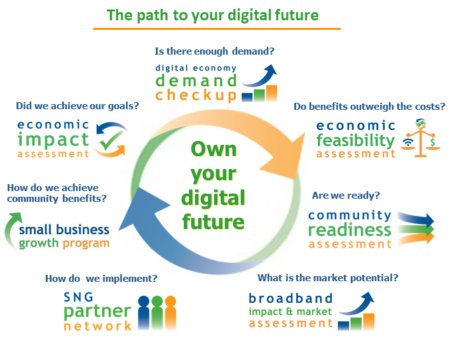Broadband’s Benefits
Broadband and digital infrastructure provide the platform for innovation, communication, and participation in a digital economy. Is your community poised to compete, or be passed-by?
Economic growth and secondary investment enabled by broadband is 10 times the initial broadband investment.
Broadband is the most important differentiating infrastructure today and is critical to the economic competitiveness of local businesses, and the well-being of residents. Moreover, education, healthcare, business operations, workforce training and readiness, and smart community services all rely upon advanced broadband networks.
There may be concerns that broadband enables local dollars to be spent elsewhere, taking money out of the community. However, this is already happening. Individuals choose where and how to spend their money to get the best value for them. Rather than trying to prevent, or slow down the outflow of local dollars from buying online in an increasingly online economy (e.g. buying from Amazon), communities need an economic development strategy that views an online economy as opening new markets for their businesses. What are those new markets and opportunities? Which ones should local businesses and residents focus on for sustainable economic and community development?
Increasingly, communities and regions are taking steps to owning their digital future to compete economically, improve local quality of life, and stay relevant in online world. Broadband and digital infrastructure are an enabling platform for:
- Business Growth and Economic Development – Improve local productivity and competitiveness through online business practices that increase revenues, reduce costs, and improve customer service. Being online enables businesses to be anywhere and serve customers everywhere.
- Workforce Readiness and Development – Improve access to online education, skills development, and training to meet growing and evolving demands of employers. Better jobs mean higher incomes and better quality of life.
- Regional Development – Attract, retain and grow innovative businesses, allowing the local economy to become more diverse and resistant to economic shocks, as well as provide well-paying, high-quality jobs.
- Education – Bring online resources into the classroom while enabling seamless communication and partnering among teachers, students and parents.
- Health Care – Share networks and services that improve responsiveness, reduce operating costs, and provide patients with a broader spectrum of enhanced services, including remote diagnostics, administration, scheduling, and electronic patient records.
- Public Safety & Emergency Response – Rapidly connect response teams with vital information to improve coordination, timely reaction to accidents and events. Citizens also benefit by gaining access to the information and tools they need to make decisions and seek support.
- Citizen and Social Services – Online services improve service reach and quality, save valuable time and public money while improving overall efficiency through services like smart grid technology and platforms to communicate and collaborate.

